It’s funny but for all the years I’ve worked in and around NHS hospitals in my consultancy capacity, it’s always been a very different experience to actually going there as a patient. Not that I don’t want to empathise with the lot of the patient and their relatives – I very much do – but when it’s yourself at the receiving end it’s difficult to retain the same helicopter view and objectivity. Or is it?
I’ve just returned home from 4 days in Colchester General hospital, which is now unique in being the only healthcare establishment in which I have both worked and been treated, albeit the work was a number of years ago and somewhat fraught due to management crises. The new regime under CEO Dr Gordon Coutts seems well in place and to exude greater confidence at the point of delivery, no bad thing. I can’t vouch for their current financial stability, but regard this blog as an anecdotal review of the Colchester Trust customer services and delivery skills.
But the wellness of the Trust was the last thing on my mind last Saturday. In the morning I remember getting what felt like a stitch on the right side of my abdomen. Primarily the front side, though with some pain referred to the side and back, but even so it reminded me strongly of my previous encounter with emergency surgery – the kidney stone, circa 1990 – because I could not escape the pain, and standard dose paracetamol would not touch it.
For a while I did the manly thing and ignored it entirely, notably because I had a date arranged and had prepaid cinema tickets to see Quartet, and I was damned if I was going to miss that! It was uncomfortable though I did sit through and enjoy the movie, but thereafter I went straight home and to bed, slept for 90 minutes but spent the rest of the night tossing and turning.
Come Sunday morning and friends were texting in legion to ask me how I was and suggesting I call, variously, NHS Direct, the out-of-hours doctor service or 999 to call out an ambulance! In practice I managed the first two before it became painfully obvious that there was no alternative but to visit A&E to get the hands-on experience from a qualified doctor.
However, when you live alone out in the sticks, it’s a Sunday morning and the local clinic is closed this does present a logistical issue, especially if an ambulance is not a feasible option I would consider for other than life-or-death situations. As luck would have it, a good friend was available to drive me over there, since any other alternatives to get to the far side of Colchester were tortuous and/or expensive. A&E at Broomfield hospital, Chelmsford, is equidistant in the opposite direction, and my memories of going there on a Sunday were of a very long and painful wait for my ankle to be X-rayed, so friend and I agreed on Colchester.
She suggested I pack an overnight bag, and later suggested I had been in denial about the seriousness of my condition since apparently it was only me who thought I would be back home to feed the cats on the same day. In hindsight, I wish I had packed far more stuff, but then 20/20 hindsight always has been a wonderful thing!
Arriving at A&E it was evident this was a quiet Sunday morning. Maybe 20 people were waiting, one of whom was clearly a season-ticket holder intent on telling everybody her life story at maximum volume. OK, you get mild eccentrics everywhere, and this was definitely a case for tolerance and knowing looks rather than calling the security guards!
By this time the pain on my right side had risen by one or two notches, so I was not able to keep still, nor to escape its clutches. In the scheme of things, it was probably no more than 45 minutes before I got to see a triage nurse but while you’re waiting in agony every second takes an hour. Would that they could find a solution for queueing in the Casualty ward, but TV or magazines would not have worked at that moment.
The triage nurse took one look, asked a few questions, put a canula in my hand to take a blood sample and left it there to begin his paperwork. Whatever any doctor thought, I knew instantly from his face that I would be admitted without delay. The cliche among the ignorant goes thus: get elective treatment on the NHS and you’ll be kept waiting for weeks, months, years, which is the mythology and perception I was dealing with while working on 18 Week initiatives. In practice, I’ve now been admitted twice for emergency treatment out of three stays in hospital – which proves if nothing else that I’m not exactly a malingerer. The response rate when you need instant help is truly astonishing – we’re talking vertical lift-off!
More painful waiting with friend, but within an hour I had been seen by a nurse (to administer further tests) and an A&E consultant. She had booked me for an abdominal X-ray, referred me to her surgical colleagues in a flash, and authorised a dose of tramadol. I’m not aware of having had tramadol before but the effect was wonderful – not only did the pain become tolerable but I hovered in a dreamy state between sleep and consciousness for some hours – away with the fairies! Not good if you’re driving, but at the time it was pretty damn good! Over the course of the next few days I went through cocktails of painkillers in various combinations, up to and including oromorph, but forgive me if my memory is hazy about which I was taking at what time.
At this point I was whisked off to the EAU (Emergency Assessment Unit) for a brief hello-goodbye while the medics decided what to do with me behind the scenes and my good friend, who had sat patiently through these stages, went home to enjoy the rest of her Sunday, but not before arranging with my neighbour to feed the cats (think I owe her a flowers and a good dinner when circumstances permit!)
From there I was transferred up to my very own side-room on the newest and brightest are on the hospital, Mersea Ward, named after the local island of which I am very fond. Every few minutes, nurses were taking blood pressure, temperature and blood samples, attaching drips, canulas, applying medications. Various healthcare professionals were asking me questions which I answered as best my groggy state would permit. It occurred to me that the sheer volume of attention indicated that they were indeed very concerned about my well-being.
That evening I saw a SHO and later a registrar, who communicated precisely where the diagnosis debate had reached: three options, one of which was acute appendicitis. They had decided not to operate immediately but would come back to review the following morning. I was off nil-by-mouth for a little while and eventually got an egg sandwich, yogurt and water before going back to fasting (quite sure I lost some weight, given that it was 3 days between my Saturday lunch and my next full meal.) In the meantime, a diet of painkillers, antibiotics, anti-inflammatories and a saline drip since I was deemed to be clinically dehydrated!
In hospital you tend to lose track of time, since there are no deadlines to meet or things to do – other than inform friends and relatives where you are and what you’re doing and why, though even that is hard when you can barely concentrate on the mobile and have to pause for a snooze every few minutes. It is quite possible to spend days in a dozy state like this and barely realise it. That first night I was fuelled by codeine, to the extent that I had bizarre dreams and hallucinations (I was convinced at one point a man with a bald head and a blue jacket was standing behind me, talking to me – until I opened my eyes!) I did get spells of sleep, but was also woken by the night nurse on several occasions to do more of the routine tests.
The following morning (day 2) I saw a different registrar, a pleasant chap called Salman. He told me it was a tough call but they thought of sending me for a CT Scan just to be sure what was wrong before they dived into theatre with a laparoscopy and potential appendectomy. Fair enough, but there was an issue with this: it required me to drink a litre of fluid first, which would negate the nil by mouth and therefore keep me in hospital by at least one more day.
Discussions behind the scenes obviously continued, but by mid-afternoon the surgeon, Dr Tutton, came to visit. Swiftly he decided that the pain was localised, that appendix was the issue and that surgery was required without delay. And from that point things proceeded at breakneck speed!
I was in short order prepped for theatre, gave my permission, was interviewed by the anaesthetist and transported down by a philosopher of a porter by the name of Jim. A brief introduction to Dr Pearson and team in the anaesthetics room and I was out for the count. Or rather, Dr Pearson told me to breathe deeply three more times and then I would be out. I did so, carried on breathing but nothing seemed to happen – suspended animation. Then the lights went out!
Turns out I spent little more than an hour in theatre that Monday afternoon. Thanks to the wonders of gastrointestinal keyhole surgery, Dr Tutton’s specialty, my enflamed, necrotic and pus-ridden appendix was removed without ceremony. Better out than in, and lucky it did not burst, infect me with peritonitis, blood poisoning, septic shock, multiple organ failure and I shudder to think what else.
Once the anaesthetic wore off, I spent a very uncomfortable night with little sleep and lots more painkillers. Moving was uncomfortable, and a drain from my midriff to flush out the orangey-red fluids sloshing around my gut did not help. It’s not possible to undergo invasive surgery without discomfort, but compared to the days when even routine minor ops like an emergency appendectomy were done with open wounds and stitched up, and recovery periods were at least twice as long. This makes you realise how far the medical profession has come in a relatively short time – as does the presence of digital machinery for conducting all manner of minor tasks (measuring the flow of a drip, conducting blood pressure, temperature etc.)
For my first two nights, pre- and post-op, my temperature rose alarmingly, hitting 39.3 at some points. I was feverish, trembling like I had Parkinson’s but feeling cold – and then later so hot I threw off bedclothes and the flimsy gown I was wearing, had the window opened wide and still felt boiling hot – and this is not even mid-January. The IV paracetamol and antibiotics gradually brought temperature down, but severe fever is apparently common in these cases, particularly where gangrene is involved.
By Tuesday, things had improved greatly. I even managed lunch, having chosen a pork meatloaf with creamed potatoes, cabbage and gravy. The following day I had cottage pie (made from fresh cottages, of course) and fresh rice pudding. A supper of baked potato and salad was eaten with butter, since the cheese had run out.
Granted NHS food will never be cordon bleu – foie gras, lobster and champagne are off the menu unless you have unlimited funding – but I found it fascinating how well they have come to terms with the bad press given NHS catering in recent years. Indeed, it reached the point where Jamie Oliver and other chefs have jumped on assorted bandwagons in order to be unofficial spokespeople about hospital food. Within a budget of (I think) 70p per meal there will always be limitations, but the quality and palatability does vary a lot – and I speak having sampled canteens in many a hospital. In some cases you feel that if the board had to eat the food, the quality would improve markedly.
Patient food is a different ballgame though. The choice has to allow for many dietary preferences, restrictions and fads, and it tends to avoid being but overall it could be a lot worse. Maybe cheap ingredients, with much reliance on prepackaged extras (eg. orange juice), but the encouraging thing for me is that junk food is notable by its complete absence – not a fried dish to be seen anywhere – and cooked dinners are made freshly on the premises: many a pub and restaurant should take note there. They may not necessarily look massively appetising but they do taste OK and well cooked, for which we should be grateful.
Interestingly, I had far more complaint when I was waiting to come home and went in the public canteen. Little food was left by this stage, but smallish parcels made from goats cheese and mushroom were selling for £4 each. My local Indian would charge less for freshly-made samosas than that! Subsidy may have been eroded but at least patients are given half-way decent dinners that deserve greater appreciation.
Meanwhile, recovery continued with my moving as little as possible. Movement equals pain in post-op, no matter how much the staff encourage you to move. Everything becomes slow and difficult – you turn into one of those feeble people occasionally seen on TV, the life sucked out of them. It’s hard work and you feel every nuance, every twist, every step. Going to the loo is an ordeal, even when said loo is but a few paces away.
Skip forward a day and things gradually became much easier. In due course my dose of antibiotics was complete, my drain removed (a bizarre sensation, to put it mildly), the half ton of canula hardware residing in my left hand removed, and I was eventually discharged after 4 days. Not that recuperating stops there, of course. I have a stack of drugs to take, a doctors certificate, and strict orders not to do anything strenuous or drive for several weeks – not least because I would not be insured in the event of an accident, since I would not be able to conduct an emergency stop without my stomach muscles being fully on song and tuned up (at present they feel like they’ve done 15 rounds with the Klitchko brothers.)
Still, I shall manage with the help of friends, neighbours and online shopping sites. Just hope I won’t have to withdraw from the play, though anybody coming into the role would have less than a month to learn a reasonably-sized part. Problem is that I can’t get to rehearsals and nobody lives close enough to chauffeur me to Chelmsford. Enough of this already!
One more topic to talk about and that is the NHS staff I encountered during my stay. I lost count of how many there were at all levels, tell the truth: I saw student doctors, SHOs, registrars, consultants, several anaesthetists, nurses of all grades, sisters down to students; porters, healthcare assistants, cleaners, caterers, a pharmacist and a phlebotomist. And probably a whole lot more I can’t remember due to my fuzzy state. They operated on shifts around the clock and whenever I needed anyone someone was there to help. To a man and a woman, each one I saw was competent, efficient, caring, warm, friendly and helpful. They always had a cheery word, they communicated effectively to my defective ears and treated me with respect, awareness and compassion at all times. And (a big ‘and’) they listened to me.
No words of praise are high enough for the various teams, though I wish to goodness they could do away with paper forms and get integrated handsets able to access central records, and placing patients by barcodes or later technologies. It has to be possible to make the jobs of these skilled and dedicated people easier to perform by cutting out laborious repetition and inconsistency, of automating pathway decision tables, and linking and communicating with all other necessary professionals along the way to keep them posted with developments.
But whatever the next stage for the NHS, it’s good to see that whatever appalling government meddling goes on the heart of our Health Service beats on in the breast of every member of staff. To each and every one of you I say a warm and heart-felt thanks for how you treated me, for the quality of your services, for your speed of response, and most of all for your caring.
If you need to go to Colchester General, go with confidence. Your experience may well not mirror mine, but you will find it clean, efficient and dedicated.
PS. The twist in the tale: as I was packing up to leave, a doctor mentioned to me that the X-rays revealed that I do indeed have a small kidney stone too, and would be getting a call to arrange a meeting with a urologist in due course! Shame they couldn’t have arranged the urologist to join in the op to kill two birds with one… er…. stone!
PPS. Following a friend’s request, the pain before the op was all-invasive – you can’t escape it, whatever you do. You just want to keep moving and not sit still. After the op was very painful for a day or two, but far less so when lying perfectly still. Thereafter, the more you move or cough or fart, the more it hurts, though of course they do encourage you to move all you can bear, aided by painkillers.
After 3 days at home, I’m finding it’s catching back up with me – a dull but insistent ache on the right side of my abdomen, which grumbles when I move. Perhaps simply the sign that I need to take it easier and let time work miracles, not that I’ve exactly been swinging from the chandeliers. Quoted recovery periods of several weeks are not accidental, and while this in the scheme of things may be a minor op any invasive gastrointestinal surgery is risky and traumatic. If you have an op, listen to what your docs say!!
PPPS. Since this was written I’ve had another procedure at Colchester General, this time on the kidney stone using ultrasound. A slightly odd sensation to be sure, but uncomfortable rather than painful. And service was quick, friendly and helpful at all times. Ignore the fact that Colchester General appears in the list of 14 Trusts allegedly having a higher death rate than expected, according to Health Secretary Jeremy Hunt (a man who believes in homeopathy, I need hardly remind you.) Don’t believe a word of it – the treatment at Colchester is excellent.
PPPPS. Unfortunately the Management of the Trust under Dr Coutts did not end well. See here.

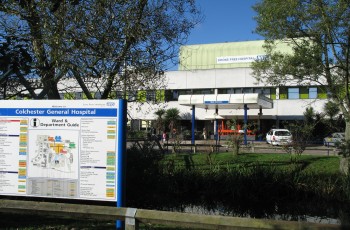
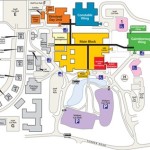
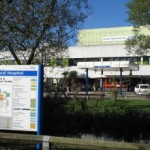


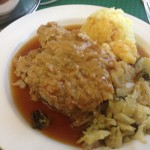
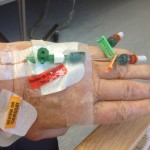
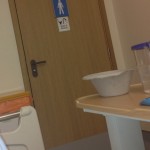
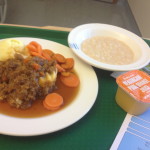
I enjoyed your article and feel heartened by your positive comments. My experiences of NHS have always been good both for myself and family. The only observation of change that I would make is that there is much more ‘ life and death’ in the job because only seriously ill people are admitted and as soon as you are on the mend you leave, which must add to stress for staff. At one time in Nottingham, there was no private place for nurses to cry after losing a patient.
The food seems to have gone from a situation where there was always some spare, to so tight that if you dropped your ice-cream there was no replacement, to speciality food can be ordered (even if you’re white uk) so I had authentic chicken, rice and peas sent in !
The vociferous and/ or demented elderly demand a disproportionate amount of nurse time, leaving timid elderly and other quite ill people to cope unaided with drips, drains, pain and toilets.
Many thanks for the comments, Helen.
Granted in the time I was there I did not observe any life or death experience, though professionally I have heard this issue debated. It’s one my ex-wife knows well, given that she works as an OT on a ward for terminal patients at the Princess Alex in Harlow. Given how upsetting and traumatic the work can be I doubt any NHS boss would not be so hard-hearted as to find time and space for staff to grieve. We are all human, no matter how professional our mask.
As for the food, I never got around to ordering anything in (only had one visitor, who brought Maltesers and OJ!), though had I had an extended stay that might have been a possibility.
The NHS is too good to lose or water down. Having always been slightly right of centre with my politics, I had a strong sense of having erred in voting Tory at the last election when, soon after, there was talk of selling off my local hospital to the private sector, This is not just any NHS hospital either; this is Trafford General, formerly known as Park Hospital, Davyhulme. This would not just be terrible from a practical point of view. Symbolically, it would be horrific, as this was the FIRST of all NHS hospitals, an historic milestone. Numerous petitions and protests later, it still has NHS status, thank the Lord. Its closure as an NHS hospital, I sense, would be the thin end of the wedge, a sign of many retrograde steps to come. For all my right wing-ish tendencies, I am proud of what remains of the UK welfare system. While, like anything, it should be constantly reviewed, we must never lose it. Having travelled further abroad this year than ever before, I am coming to realise that, however flawed this country is, we do get things right more than most. The NHS, again with all its failings, is too good to lose; it’s part of what does make Britain great. Glad you were well cared for, Andy. Still agree with that greatest of all History teachers, Wilmslow Boys’ Grammar’s Mr Newcombe (that was his name, wasn’t it? Didn’t think I’d ever forget!): that where education, law and health are concerned one’s ability to pay should never be an issue.
It was indeed Mr Newcombe, though in the ensuing years I’d forgotten he said that. Did strike me as a slightly old-fashioned socialist in outlook and dress-sense though 🙂
My commitment to the NHS, given that I have spent so many years working in it, is absolute. Interesting comparison to the American system, where even mildly hybrid systems like “Obama care” are denigrated and the NHS regarded with huge suspicion – the right regard it as “socialised” healthcare, “big government” and interference in an individual’s choice – without looking at the massive problems caused to families without health insurance or with insufficient to fund ongoing healthcare and recuperation, let alone the best drugs or operations.
The NHS is far from perfect, and I could list many things I think should change. But the biggest thing wrong is that governments meddle and tinker where they should allow boards to get on and do the job for which they were employed. Thankfully it is still free at the point of delivery, and without checking credit cards or health insurance policies. The staff are incredibly dedicated and the scare stories in the press (whose editors are on nice private schemes) give a wholly misleading portrait of reality.
For those who know and see that the vast majority of patients get a first class service, which could barely be improved if it were private. For these mercies I give thanks to Nye Bevan and the founding fathers of the NHS.